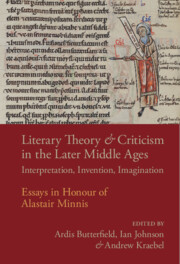Book contents
- Literary Theory and Criticism in the Later Middle Ages
- Literary Theory and Criticism in the Later Middle Ages
- Copyright page
- Contents
- Figures
- Contributors
- Preface and Acknowledgements
- Abbreviations and Conventions
- The Career and Contributions of Alastair Minnis
- Introduction
- Chapter 1 Access through Accessus
- Chapter 2 Scholastic Theory and Vernacular Knowledge
- Chapter 3 Poetics and Biblical Hermeneutics in the Thirteenth Century
- Chapter 4 Robert Holcot and De vetula
- Chapter 5 The Inspired Commentator
- Chapter 6 Guitar Lessons at Blackfriars
- Chapter 7 The Re-cognition of Doctrinal Discourse and Scholastic Literary Theory
- Chapter 8 Arts of Love and Justice
- Chapter 9 The Many Sides of Personification
- Chapter 10 Encountering Vision
- Chapter 11 George Colvile’s Translation of the Consolation of Philosophy
- Chapter 12 When Did the Emotions Become Political?
- Bibliography of the Works of Alastair Minnis
- Bibliography
- Index
Chapter 10 - Encountering Vision
Dislocation, Disquiet, Perplexity
Published online by Cambridge University Press: 20 April 2023
- Literary Theory and Criticism in the Later Middle Ages
- Literary Theory and Criticism in the Later Middle Ages
- Copyright page
- Contents
- Figures
- Contributors
- Preface and Acknowledgements
- Abbreviations and Conventions
- The Career and Contributions of Alastair Minnis
- Introduction
- Chapter 1 Access through Accessus
- Chapter 2 Scholastic Theory and Vernacular Knowledge
- Chapter 3 Poetics and Biblical Hermeneutics in the Thirteenth Century
- Chapter 4 Robert Holcot and De vetula
- Chapter 5 The Inspired Commentator
- Chapter 6 Guitar Lessons at Blackfriars
- Chapter 7 The Re-cognition of Doctrinal Discourse and Scholastic Literary Theory
- Chapter 8 Arts of Love and Justice
- Chapter 9 The Many Sides of Personification
- Chapter 10 Encountering Vision
- Chapter 11 George Colvile’s Translation of the Consolation of Philosophy
- Chapter 12 When Did the Emotions Become Political?
- Bibliography of the Works of Alastair Minnis
- Bibliography
- Index
Summary
Focusing on the Middle English poem, Pearl (with evidence from other literary works), this essay considers how the initial situation of the Dreamer explores a half-dozen principles for literary invention that are distinctively medieval, including personal displacement and feelings of anxiety, bewilderment and marvelling. These qualities define the initial state of mind which enables the Dreamer’s visions to occur and develop. Aristotle wrote in his Metaphysics (I. 2) that philosophising begins with wondering and questioning, a principle revered throughout the Middle Ages. Though all these elements of what we now call ‘creativity’ have their roots in practices of invention and argumentation described in ancient philosophy and rhetoric, the particular shapes that these classical principles assume by the late Middle Ages derive from long-established traditions of monastic meditation and contemplative envisioning more than from academic rhetoric and logic. Bonaventure’s opening to his Itinerarium mentis ad Deum recounts the marvel of Francis of Assisi’s seraphic vision, adapting it as a general method for meditation; Chaucer’s Squire’s Tale turns the marvels of the flying horse and visionary mirror into problems in optics and engineering. Pearl turns the dreamer’s initial wondering within a brilliant fantasy to the means for understanding his own human condition.
Information
- Type
- Chapter
- Information
- Literary Theory and Criticism in the Later Middle AgesInterpretation, Invention, Imagination, pp. 206 - 219Publisher: Cambridge University PressPrint publication year: 2023
